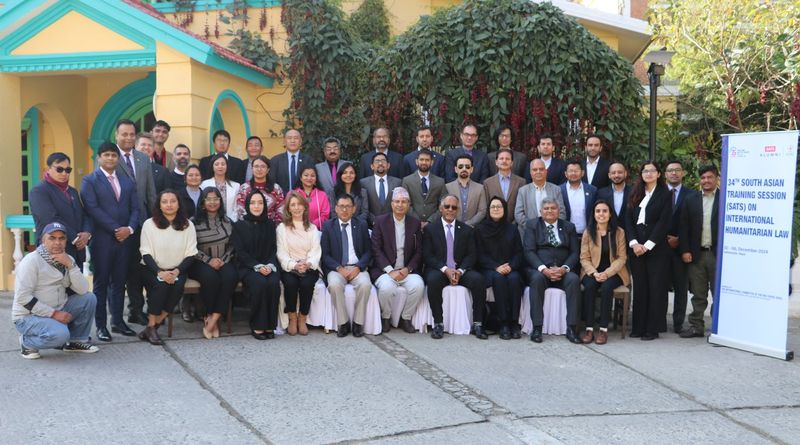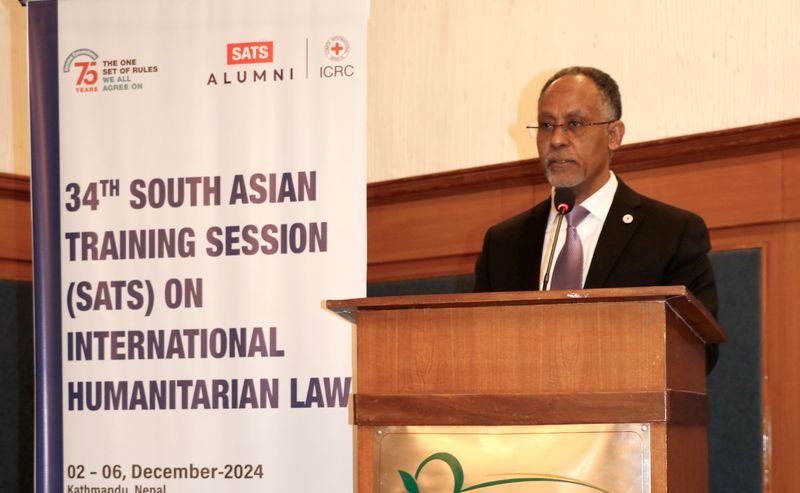The week of 2 to 6 December 2024 marked the 34th edition of the South Asia Training Session (SATS) on International Humanitarian Law (IHL). The ICRC New Delhi Regional Delegation organized this year’s edition in Kathmandu in close coordination with the ICRC Nepal Office and ICRC legal advisors from South Asia. Unlike the SATS that was cancelled in 2020 and 2021 due to COVID-19 and held online Asia-wide in 2022, this year’s training was held in person with 34 participants from 8 countries: Bangladesh, Bhutan, India, Iran, Maldives, Nepal, Pakistan, and Sri Lanka. Participants included foreign ministry officers, defense and national society representatives, academics and lawyers from these countries.
Kedir Awol Omar, Head of the Regional Delegation (HoRD), alongside the Secretary, Nepal Ministry of Law & Justice presided over the inaugural ceremony. In his opening remarks, the HoRD highlighted ICRC’s High-Level Initiative on IHL and how SATS is an opportunity for stakeholders to deepen their knowledge of IHL and deliberate on how states can recommit themselves to IHL.
In his keynote address, Secretary, Nepal Ministry of Law & Justice, highlighted Nepal’s commitment to IHL and justice including the transitional justice commission.
ICRC legal advisors and thematic experts led 15 discussion sessions along with SATS alumni. The sessions were designed to include lectures, peer-to-peer exchanges, panel discussions, group work, case studies, and recap quizzes.Participants reported in their feedback that they built both foundational knowledge of IHL and insights into contemporary challenges facing IHL. SATS covered discussions on a wide range of 15 core topics ranging from the relationship between IHL and other branches of International Law, Means & Methods of Warfare, Conduct of Hostilities and Use of Force, Protection of Civilians & Direct Participation in Hostilities, Law of Armed Conflict at Sea, Persons Deprived of Liberty in Armed Conflict, Protection of Women Children and Healthcare Personnel, Protection of Cultural Property and Other Civilian Objects, Protection of Natural environment During Armed Conflict, Peacekeeping and IHL, New Technologies of War, IHL during peace and in post conflict settings, and Implementation of IHL.
Key topics of interest where participants engaged actively included potential reform of the United Nations and strategies to encourage non-signatory states to accede to IHL treaties, underscoring the need for a more substantial global commitment to humanitarian norms. The intersection of IHL, with IHRL, and ICL, particularly regarding the protection of vulnerable groups like women and children (especially child soldiers) prompted discussion. Another topic of interest was how religion and culture influence IHL. Participants took a keen interest in conflict classification, especially in contexts where multiple situations of violence co-exist, as well as in the categorization of actors in armed conflict, including membership criteria for fighters in non-international armed conflicts, levels of participation (political, economic), and the legal implications of voluntary support to armed forces. On the Conduct of Hostitiles, participants were interested in topics such as combatant immunity; the required nexus of IHL application and legal targets under IHL, and the meaning of feasible precautions.
Regional and contemporary issues were another area of interest, with participants inquiring about a potential regional IHL enforcement mechanism for Asia. Discourse around emerging technologies, including use of cyberspace during armed conflict, and the categorization of critical infrastructure during cyber operations highlighted the increasing relevance of technology in modern conflict scenarios. Other areas of interest included protection of cultural property during armed conflict, rules surrounding disarmament treaties, and deployment processes of peacekeeping missions also stimulated thought-provoking discussions. Finally, in terms of IHL enforcement, participants were interested in National IHL Committee, responsibility in cyber operations and criminal repression under universal jurisdiction.
On the evening of the event’s final day, 6 December, ICRC legal advisers from South Asia gathered for a dinner to discuss the event’s positive aspects and areas for improvement for the next edition of SATS in 2026.
Initiated in 1998, through the SATS, the International Committee of the Red Cross facilitates a platform where participating states can share best practices, exchange experiences, and address contemporary challenges related to the application of IHL in the region. SATS has become an ICRC flagship event for the promotion of IHL principles in the South Asia Region. It serves as a platform to foster a deeper understanding of contemporary IHL issues, and to build a very unique regional network and platform for engagement. The interactive and cross-cultural approach of SATS aims to equip participants with the knowledge and tools necessary to apply IHL effectively in their professional fields. By fostering meaningful dialogue, SATS contributes to a deeper understanding of the law’s crucial role in mitigating the humanitarian consequences of armed conflict.






